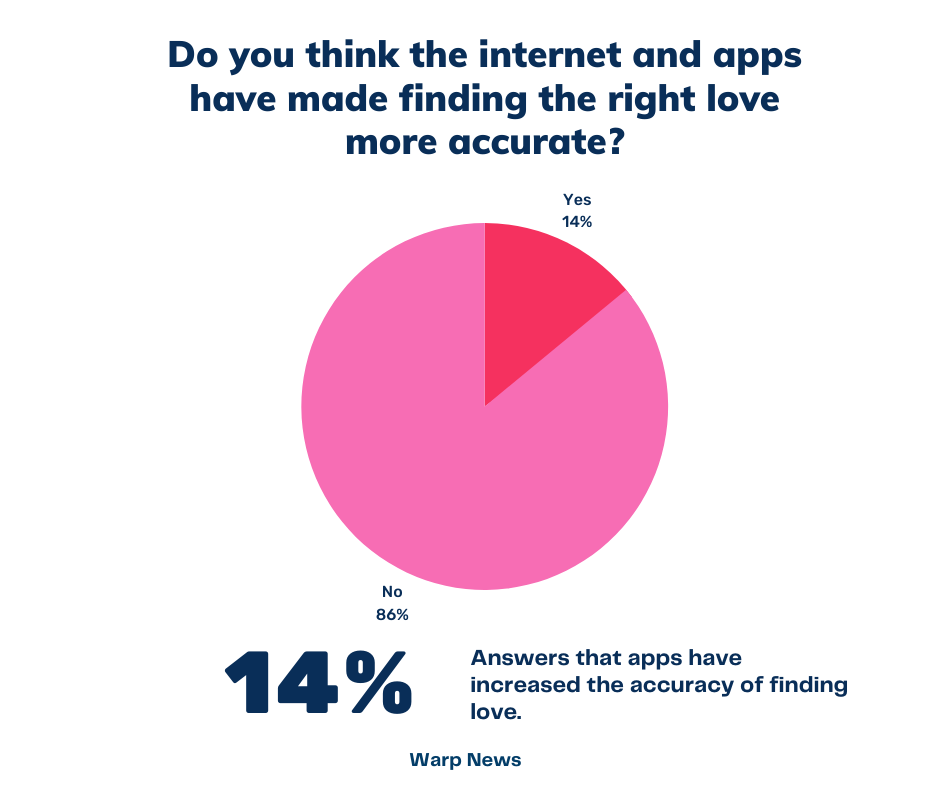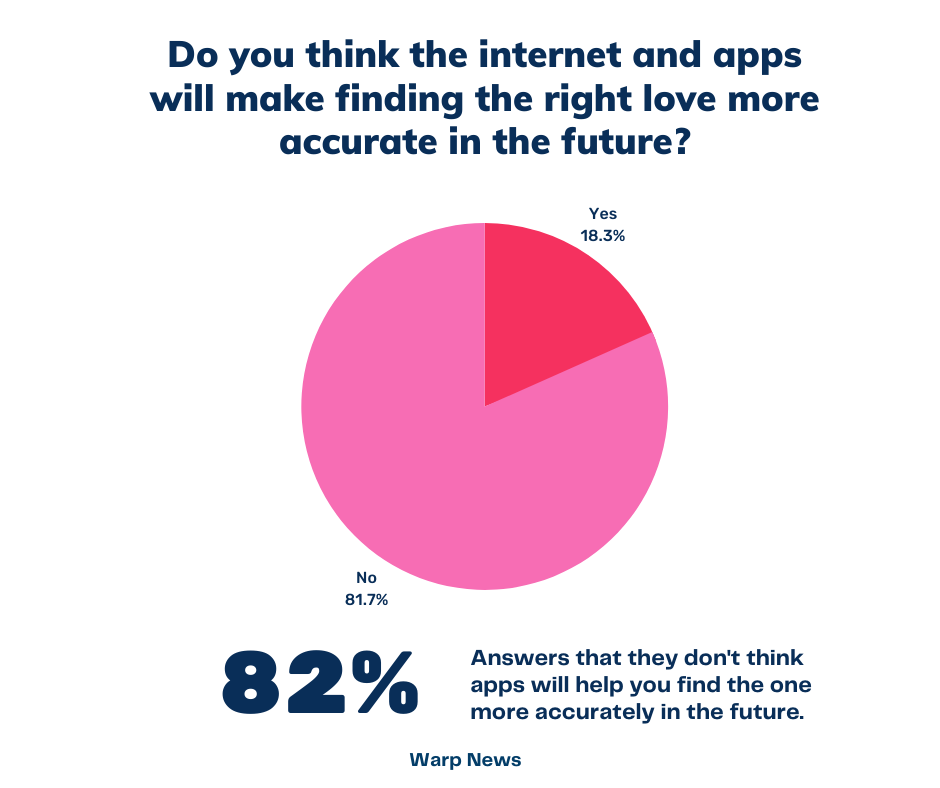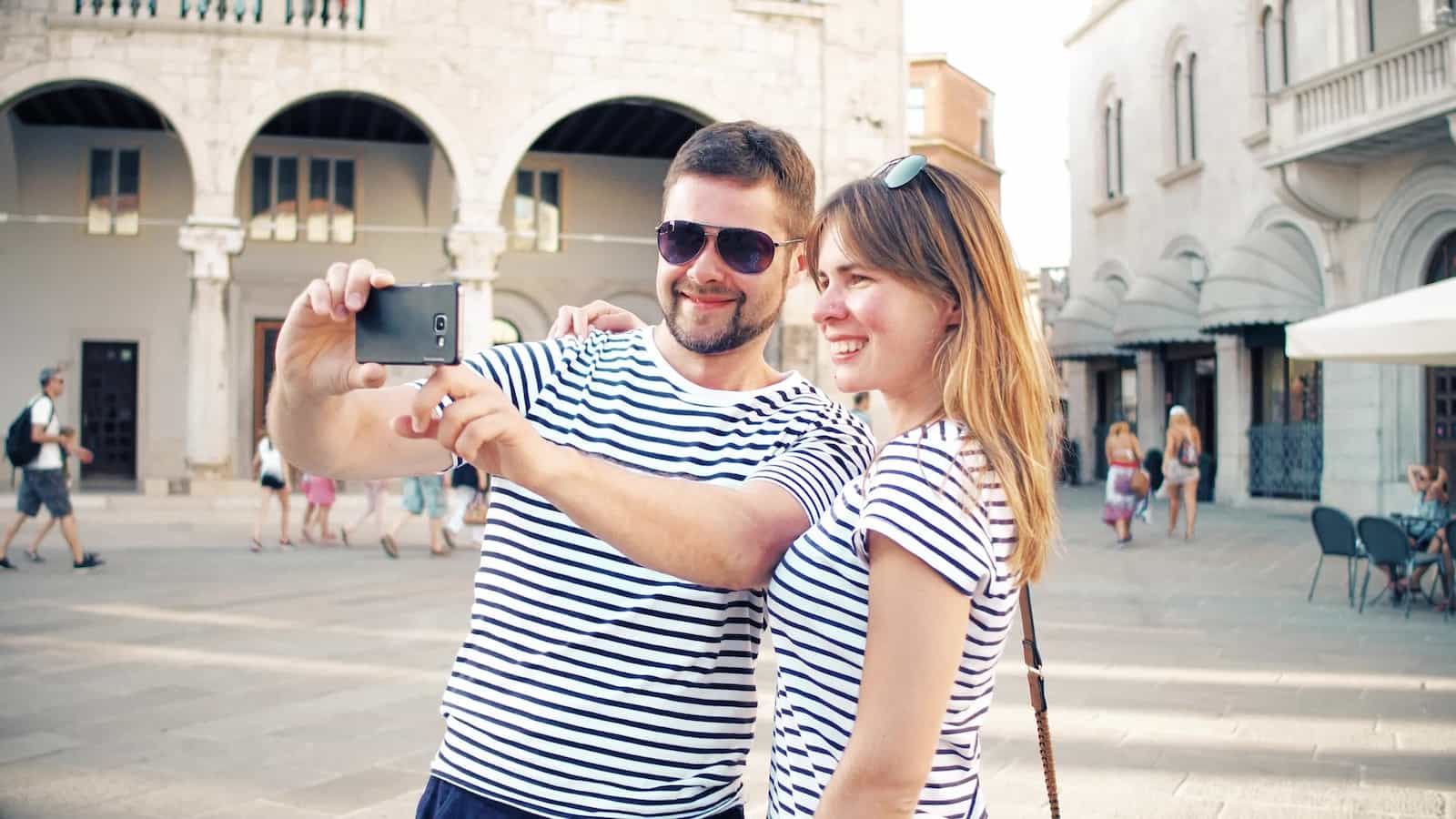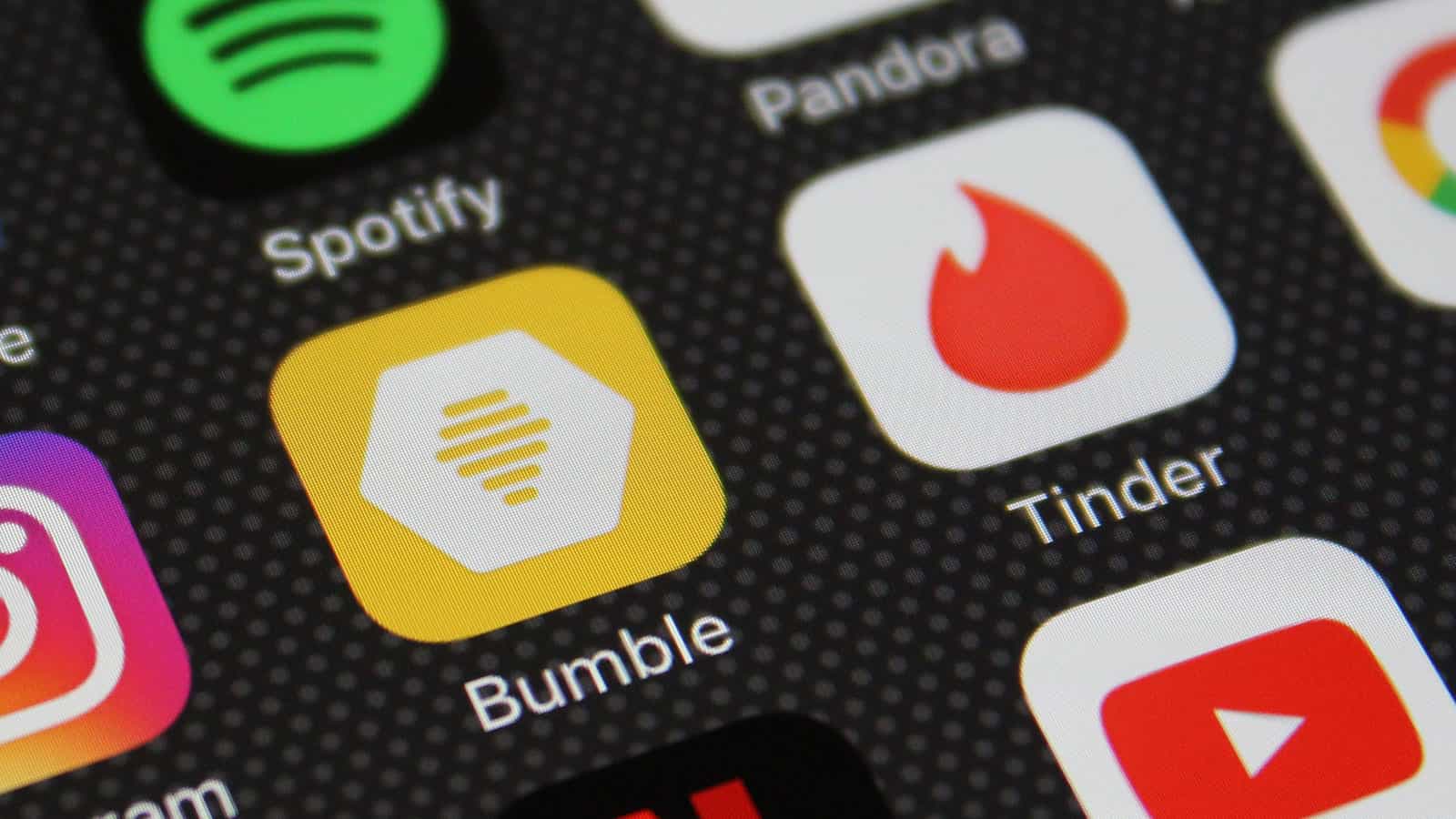
💡 Optimist's Edge: Finding love online works better than most people think
A lot of people love to hate dating apps. But if you are looking for love they are probably the best tool you could use. We explain why, and the numbers behind it.
Share this story!
Summary
📉 What people are wrong about
In Warp's survey, 82 percent say they do not believe that apps and the internet will make it easier to find love in the future.
86 percent answer that they do not think that apps have made it easier to find love so far either.
📈 What the facts say
Dating apps have transformed dating worldwide – for the better.
Statistics indicate that dating apps work. A majority who use dating apps have a positive experience and studies also suggest that couples formed with the help of dating apps are stronger.
A study conducted in Switzerland showed that couples who met online had a stronger wish to live together, than people who met offline.
In another study scientists simulated how dating apps effects societies, and they found that couples who met online could have a more solid relationship. The same study also found that online apps increases interracial marriages.
It is not strange that apps works this well, because love is not the work of destiny or whim, it is explainable with science.
💡 Optimist's Edge
👇 What you can do to get the Optimist's Edge
If you want the edge, you can start by calculating how big the area of the search needs to be for you to have a decent chance. For this, you could use Hannah Frys' model.
You do this by breaking down the problem into smaller parts. How many people with the gender you are looking for lives in your area? How many of these are in the right age span? (about 20%). How many are singles? (maybe 50%?). How many have the level of education you are looking for? How many will you find attractive? (maybe 20%). How many will find me attractive? (?). How many of these will you like? (maybe 20%). If the number is very low, you need to look in a larger area.
To increase the chances of being matched with someone you have a lot in common with, you need to share information about yourself. Maybe your interests, values, favorite thinkers? Having a niche hobby does not have to be something to hide!
Also, keep an eye on new apps that are on the way that use such things as personality, data and DNA in the match.
📉 What people are wrong about
In our survey, 86 percent answered that they do not believe that apps and the internet have made it easier to find the right person.

And when asked about the future, they are almost as pessimistic. As many as 82 percent do not believe that apps and the internet will make it easier in the future to find the one.
The myth that love lays in the hands of fate or magical beings seems to live on. Because fate and apps don't go together... right?

📈 Facts about love and apps
Many people want to believe that falling in love is a magical process that no science can fully unravel. But researchers are beginning to understand what makes us fall in love.
And no, magic most likely has nothing to do with it. And, of course, there needs to be something tangible about the process, or else dating apps may as well be just a way to collect more dates.
Who do we fall in love with?
In a study, scientists in Germany looked at the importance of emotional expression. Participants were asked to look at people who showed certain emotions. The study found that if a person seemed to understand what the other person felt, the same person also reported a higher degree of attraction.
To conclude, we are attracted to people we think we can understand.
There are a ton of studies in the same theme. But it's important not to jump to conclusions. For example, it seems that men (and women) are attracted to people with similar facial features, but this does not apply to women during the most fertile period of the menstrual cycle. Then women are drawn to facial features that deviate from their own.
Other studies show that we are attracted to people with similar attitudes on various issues as well as political beliefs, and that couples usually share interests, values and attitudes. Couples also tends to be similar when it comes to personality. The phenomenon of seeking similarity has even been studied and confirmed in animals, including birds.
The hypothesis that we are looking for someone like ourselves is regarded as confirmed. Researchers believe that it has to do with survival as it may be easier to survive if we understand each other. It is also possible that it has to do with the social environment and how our brain works. According to some theories our models in our brain want to minimize surprise.
One study made in the UK of 24,000 couples found that couples are similar when it comes to height, blood pressure, and to some degree BMI. Other studies have shown that you are often looking for a partner with the same level of education.
But no rules are without exceptions. Some studies support that EVERYONE is looking for a confident partner, regardless of their own level of self-confidence. But we knew that right?
Note: it's important to note that there are some conflicting findings and we may sometimes look for someone with traits that differ from our own.

✨ To encourage attraction
In addition to studying what we find attractive in others, researchers have also looked at whether this feeling can arise without the perfect conditions. In a well known study, scientists paired students based on values and interests but also paired couples who thought differently on topics that were important to them. The couples then had to do exercises that aimed to increase the feeling of togetherness and closeness.
The study showed that the experiment was successful. Several of the couples experienced a closeness to the one they were paired with, regardless of whether they had common values or not.
An unexpectedly positive result, at least with the history of failed dating shows on television in the back of your mind. The United States' large dating flagship Bachelor and Bachelorette, must be considered a failure in that aspect.

But if it is true that it is possible to evoke a sense of closeness, modern dating via apps could be very successful, as long as the ongoing conversations have the purpose of increasing just that.
🦄 We are different
We are unique and that is a good and strengthening insight for those who are in the world of dating apps. We don't aim at the same partners. Just take a look at the scope of uniqueness in these answers.
What's the weirdest thing you find attractive? from AskReddit
🤨 Why does this matter?
Well, because if science can figure out what it really is that makes us fall in love, the chances increases for you and me to find our person, with the help of technology.
🔎 How do I find the right one?
Even if we know what it is that increases the likelihood of love-chemicals to burst, we still need to put in a certain amount of effort to find that match. This is exactly where technology comes in.
According to the book Mathematics of Love, you can use the Drake equation to calculate the number of potential partners in your area. In the case of the author, there are a total of about 30 people. With so little people, the chances decrease dramatically.
So, to calculate this, break down the problem in to smaller parts:
- How many of the gender I am interested in live in my area?
- How many are the right age? (about 20%)
- How many are singles? (about 50 percent?)
- How many have the level of education I am looking for? (about 20%)
- How many will I find attractive? (about 20%)
- How many will find me attractive (?..)
- How many will I like? (about 20%)
❤️ A little (a lot) more numbers that speak for dating apps
Now we have straightened out what makes us feel attracted - and that's similarity! But the question still remains whether dating apps have a good track record of helping us find love, and it turns out they do!
Simulations of how dating apps effect the forming of relationships in societies has shown that apps can make relationships stronger.
According to a Swiss study, couples who met online were more eager to move in together, and women were more eager to have children soon.
By 2037, the majority of all babies will be born to parents who have met via a dating app in the UK (according to a study by Eharmony).
32% of all couples in the UK have arisen via dating apps (according to the same study).
In the US, 60% of all LGBT people have met via dating apps and the figure for heterosexuals is 40%.
According to an older study which looked at how relationships that starts online stand long term compared to people meeting offline, it was found that there were a lower proportion of divorces in this group.
According to a Norwegian study, people who used Tinder had a higher chance of meeting someone than those who did not use Tinder. Something that researchers linked to the fact that Tinder users tend to be more extroverted.
According to studies on app dating, most people are happy with their experience and find it easy to find an interesting person via apps.
According to a study Tinder users are more likely to have a committed relationship.
💡 Optimist edge
Dating apps have reshaped the way the singletons of the world date, and its probably just the beginning.
The method of using science in the mix has infinite potential. People could be matched by, for example, the way we talk, our values, our data, our personalities and more, and it could potentially increase accuracy and be a good way to "sort".
Only the fact that you as a user, get basic information about prospects makes the process more efficient than just "dating" by chance. If this is the case, that similarity is the single most important factor in love, that might explain why dating apps seem to work well.
🤔 And maybe...
It may be unlikely that the solution is found in ONE gene, or ONE algorithm, or ONE personality test, but perhaps (author speculate) it is the total similarity that should reach a certain critical amount for love to arise. That is, that the attraction chemicals switch to dopamine and serotonin, among other things.
If that would be the case, then the future is bright because then AI could help!
💘 Sure - but there must be some aspect of mystery involved right?
Doubtful. But it is possible to look at love as a scale. Perhaps there is a certain degree of chance that determines whether any love arises at all when the critical amount of similarity is reached (authors theory).
An important advantage of dating apps is that the technology gets smarter and more efficient. This is especially relevant for large cities where you cannot swipe through the whole user-pool within a day. The algorithms are evolving, which means that you will be shown more relevant potential matches. A further development of the concept could be real-time tips and help to build the relationship in the app when there is potential.
👇 How you get the edge
How well your relationship works in the long run has basically to do with how well the matching process works.
Despite what we have learned through science and despite dating apps, it can be difficult to find a partner for purely mathematical and probabilistic reasons. Therefore, it may be a good idea to look outside the area where you live. You can do this via, for example, Tinder.
Science has thus found that we are attracted to people who are similar to us. Given what we know, dating apps perhaps work better then one might think as long as people share enough information about themselves so that you can make a well-balanced choice. Geeky hobby? Favorite podcast?
If you do not choose to use apps for dating, you are completely relegated to bumping into someone, randomly.
🔍 Here is a short guide to the biggest dating apps

Okcupid
Benefits - you can specify in much more detail what you are looking for. Uses questions to figure out who is your best match.
Bumble
Benefits - Women (who sometimes have to endure harassment) are the ones who must first approve contact.
Tinder
Benefits - Biggest! Many features you can buy that increase your chances of being seen.
Eharmony
Benefits- is also based on compatibility testing with MANY questions.
Happn
Advantages: do you believe in fate, this is the app for you. Allows you to find people you have crossed paths with.
New apps
It's only a matter of time before singles are armed with a whole new level of tech, in search of the right one. A researcher at Harvard University is developing a dating service based on DNA. One of the purposes of this app is to prevent people who would have children with serious genetic diseases from meeting.
Other apps based on DNA have existed, such as the dating app Pheramor, which was shut down from the Appstore due to the appstore's current rules. It is clear that we are at the beginning of something new.
Another app that tries to use what we know about similarity is the dating app So Syncd, which uses Myer-Briggs personality test and matches based on personalities that fit well together, according to that theory.
If you like the benefit of Big Data, Facebook's own dating app could be the one to try.
📖 We end with a quote by Shakespeare – because, why not?
Shall I compare thee to a summer's day?
Thou art more lovely and more temperate;
Rough winds do shake the darling buds of May,
And summer's lease hath all too short a date:
Sometime too hot the eye of heaven shines,
And often is his gold complexion dimm'd;
And every fair from fair sometime declines
By chance or nature's changing course untrimm'd;
But thy eternal summer shall not fade
Nor lose possession of that fair thou owest;
Nor shall Death brag thou wander'st in his shade,
When in eternal lines to time thou growest:
So long as men can breathe or eyes can see,
So long lives this and this gives life to thee.
Sonnet 18, William Shakespeare
You now have an edge because you have gained this knowledge before most others – what will you do with your Optimist's Edge?
❓ What more can you do?
Please share more ideas with your fellow Premium Supporters in our Facebook group.
Note: The survey was conducted on 500 respondents using Google Surveys.
By becoming a premium supporter, you help in the creation and sharing of fact-based optimistic news all over the world.


